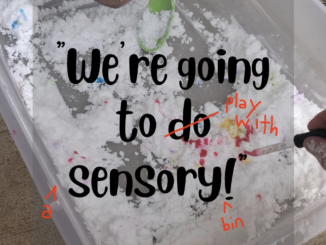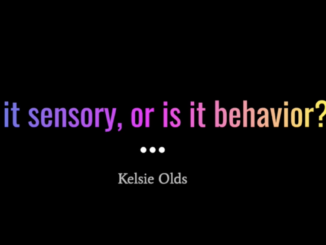I’ve written before about “sensory mismatch”. It’s one of the hardest things for people with vastly different sensory profiles to be able to get along with each other in stressful circumstances. Let me tell you another story from my own family.
The cast of characters here is myself, my son Apollo (5), and my daughter Summer (4). Apollo and Summer have been back at school for about a week and evenings are still generally an absolute meltdown in every conceivable way because everybody’s soooo tired from the day.
A few other factors:
-We’re playing an ongoing perpetual game in which Summer is a cat. (In addition to the typical way that 4yos pretend to be cats or dogs like 75% of the time, I think she also uses it as a more socially acceptable way to be nonspeaking when she just can’t summon words anymore.)
-Summer is a blend of sensory seeking and sensory avoidant, usually. She’s all over the active side of the sensory processing spectrum — she either wants A LOT of input or NOT THAT input and she knows how to get it.
-Apollo is a blend of sensory “missing” and sensory sensitive, usually. He’s all over the passive side of the sensory processing spectrum — his tolerance fluctuates depending on what sensation he’s experiencing but he usually won’t do as much about it except maybe melt down if it’s overwhelming him.
-I am sensory avoidant to the max on a good day. And having a headache and back pain on this day.
Both of them finish watching a movie and there’s still like an hour left until bedtime. Both of them get invested in different types of sensory, independent play.
Summer grabs a heavy pile rug and drags it to an open area in our house and begins running around on it, doing somersaults, handstands, and spinning in circles yelling “watch me, watch me!”
Apollo finds a little plastic tube that has two plastic caps on either end and realizes that if he smashes it with a fist or a foot then the caps will pop off in both directions. He repeats this game, finding the caps, replacing them, smashing it to pop them off, finding the caps, replacing them…
I observe quietly from the couch, intrigued by their play interests.
All is good for maybe two and a half minutes. Then Apollo wants to try smashing the tube on the rug and Summer doesn’t want to share the rug. Both of them have developed a modicum of impulse control and with it, the ability to hold grudges awhile longer (since the grudges don’t get lost in immediate other impulsive distractions). So nobody is knock-down-drag-out fighting (yet) but they’re both annoyed enough with each other that they’re just picking at the edges of each other. Summer starts spinning around with her hands outstretched, close enough that she hits Apollo with them each time. Apollo starts yelling and popping the tube near her face. Both kids insist they need to play on this two square feet of floor in the house despite all other areas available.
I stay close to them, still seated on the couch and moderating verbally mostly just by repeating and clarifying their needs to one another. “I think Summer needs space to spin. I think Apollo needs space to pop the tube. It looks like Summer is running and spinning in this space. That’s making her hands hit Apollo. It looks like Apollo is popping the tube right here. That’s making a loud sound next to Summer’s ears. Should I help anybody move? Somebody could stand in the kitchen. Somebody could stand in the playroom.” Etc etc, over the span of several minutes as they continue in this place of picking and arguing with one another but not actually fighting or hurting.
Summer’s hands are brushing against Apollo’s body. Her foot is sometimes touching his foot. I know that unwanted light touch can feel threatening and escalating and even painful. I also know she’s not literally hurting him in the sense that she’s not hitting, kicking, etc. I debate internally about whether this falls into the kind of fighting that I should physically block. For about two minutes, I don’t, to see if they can resolve it. Instead, it becomes obvious that Apollo is becoming very overwhelmed. I stand up and put myself physically between the two of them, explaining, “it seems like everybody needs some help to have enough space.”
Both kids are disappointed and let me know it. Even though they weren’t anywhere near working it out themselves, they still don’t like me having to intervene. Summer, who I know is desperately seeking lots of proprioceptive and vestibular input right now (hence the flipping and rolling and spinning), starts crawling around and meowing and hanging onto my legs and trying to pull me down onto her. I am feeling very tapped out and avoidant of that so i offer to put pillows and blankets on her instead if she wants. Apollo takes his tube and goes upstairs into his room and slams the door.
Summer declines my offer of pillows and blankets and follows Apollo on all fours. So I follow too, to make sure everybody gets the space they need. By the time I get upstairs, they’ve gotten over it and figured out how to play with each other…for another two minutes before it devolves again.
We repeat the dance. Upstairs and downstairs. Seeking companionship and seeking space for themselves. Seeking rough-and-tumble play then backing away when it’s too much. Knowing how to chase what they want and then only knowing how to run away for right now.
Later, I lie down next to Apollo in his bed. He’s gone from raging to raging-while-expressing-himself to happily playing independently to raging again like fifty times. He points at the box fan in his room and asks me to turn it on. I turn it on and he lies there enjoying the breeze on his face, a sensory feel-good strategy he’s only learned in the last week or so. He fills up his contented sensory “bucket”. We sit in companionable silence.
(Summer, in her room next door, sounds like she’s still doing rolls and flips and spins and running laps on all fours. 😆)



